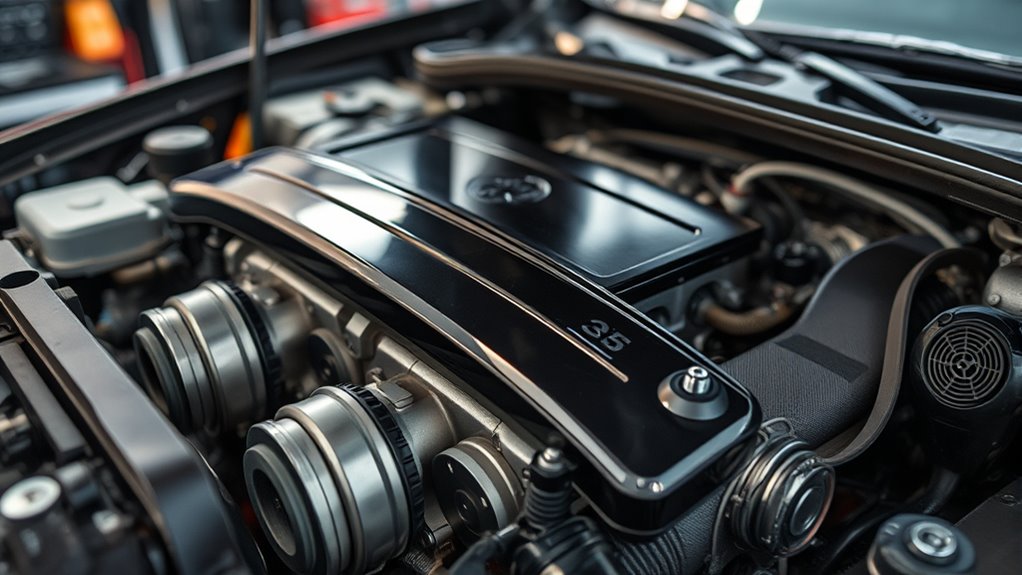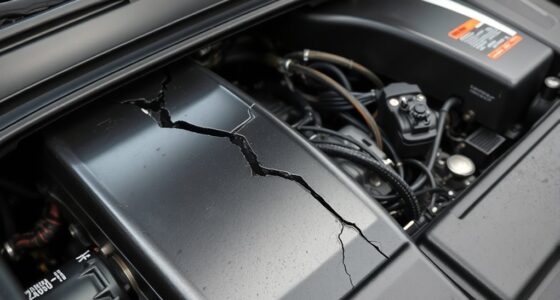Powertrain warranty exclusions often cover issues caused by defects or normal wear but exclude damage from neglect, accidents, or natural disasters. If you ignore regular maintenance or use improper parts, your coverage might be denied. External damages from collisions or natural events are also unlikely to be covered. Modifications or misuse can void your warranty too. To understand exactly what’s excluded and how to protect your warranty, keep exploring the details below.
Key Takeaways
- External damage from accidents, natural disasters, or intentional acts is typically not covered.
- Damage caused by neglect, missed maintenance, or improper repairs is usually excluded.
- Modifications or aftermarket parts that alter the engine or transmission may void warranty coverage.
- Issues resulting from driver abuse, aggressive driving, or overheating are generally not covered.
- Repairs due to natural wear and tear or defects are covered, but damage from external factors is excluded.

Understanding what’s covered under your powertrain warranty can save you from unexpected expenses, but it’s equally important to know what exclusions apply. Powertrain warranties generally protect essential parts like the engine and transmission, but they don’t cover every possible issue. Knowing these exclusions can help you avoid surprises when repairs are needed. For example, engine components such as pistons, valves, and timing belts are typically covered, but if damage occurs due to neglect or misuse, those repairs might fall outside the warranty. Similarly, transmission issues, like a slipping clutch or faulty gears, are usually covered, but only if they result from manufacturing defects or normal wear and tear. Damage caused by external factors, however, is often excluded.
One common exclusion involves damage caused by accidents or collisions. If your vehicle’s engine or transmission sustains damage from a collision, repairs are unlikely to be covered, as the warranty generally doesn’t extend to collision repairs. Similarly, damage from natural disasters like floods or fires is typically excluded. If you neglect routine maintenance, such as failing to change your oil or transmission fluid, and this neglect leads to engine or transmission problems, the warranty usually doesn’t cover those repairs. These exclusions emphasize the importance of following the manufacturer’s recommended maintenance schedule to keep your warranty valid. Regular maintenance, including fluid changes and inspections, is vital to prevent issues that are commonly excluded.
Another critical aspect to regard is modifications or aftermarket parts. If you alter your vehicle’s engine or transmission with non-original parts, any resulting issues might not be covered under the warranty. For instance, installing a performance chip or aftermarket transmission could void warranty coverage for related components. Additionally, repairs caused by improper installation or maintenance by unqualified technicians are often excluded, so it’s essential to work with authorized service centers.
Lastly, some warranties exclude coverage for issues caused by abuse or neglect. Overheating the engine, driving on rough terrain without proper precautions, or ignoring warning signs can lead to damage that isn’t covered. For transmission issues, excessive towing beyond the vehicle’s rated capacity or aggressive driving can cause wear or damage that the warranty won’t reimburse. Being aware of these common exclusions helps you protect your investment and ensures you’re prepared when it’s time for repairs. Ultimately, understanding what’s excluded from your powertrain warranty means you’re less likely to be caught off guard and can take proactive steps to maintain your vehicle properly.
Frequently Asked Questions
Does the Warranty Cover Hybrid or Electric Vehicle Powertrains?
Yes, your hybrid or electric vehicle’s powertrain is typically covered under warranty. It usually includes the battery lifespan and charging system, ensuring you’re protected if these components fail due to manufacturer defects. However, coverage can vary, so you should check the specific terms of your warranty. Keep in mind that normal wear and tear, such as reduced battery capacity over time, might not be covered.
Are Aftermarket Modifications Covered Under the Powertrain Warranty?
If you install aftermarket parts, your powertrain warranty is at risk of being voided—think of it as opening Pandora’s box for your vehicle’s coverage. The warranty generally doesn’t cover damage caused by aftermarket modifications, which can turn a minor issue into a costly nightmare. Stay safe and protect your investment by sticking to manufacturer-approved parts, because once you tamper with the system, the warranty’s shield disappears completely.
How Does Mileage Impact Warranty Coverage Duration?
Your warranty coverage duration is directly affected by mileage limits and warranty periods. As you approach the mileage limit specified in your warranty, coverage may end, even if the warranty period hasn’t expired. Keep track of your mileage to avoid surprises. Once you hit the mileage limit, your warranty typically expires, regardless of the remaining warranty period. Regularly monitoring your odometer helps guarantee you stay within coverage and maximize its benefits.
What Documentation Is Needed to Claim Warranty Service?
To claim warranty service, you need to provide your warranty paperwork and detailed repair receipts. Make certain your documentation clearly shows the date of service, the nature of the repair, and that it was performed at an authorized facility. Keep all related receipts handy, as they serve as proof that the work was authorized and completed under warranty. Providing complete, accurate documentation helps ensure a smooth and quick claim process.
Are Towing or Roadside Assistance Included in Powertrain Claims?
Towing coverage and roadside assistance typically aren’t included in powertrain claims. Your powertrain warranty usually covers engine, transmission, and drivetrain components, but towing and roadside help are often separate services. If you need towing or roadside assistance, check if your warranty or vehicle plan offers those benefits or if you need to purchase them separately. Always review your warranty details to understand what’s covered and what isn’t.
Conclusion
Knowing what’s excluded from your powertrain warranty helps you avoid surprises down the road. Read the fine print carefully so you’re not caught off guard when you need coverage most. Remember, the devil’s in the details—understanding these exclusions means you’re less likely to get burned. Stay informed, ask questions, and keep your vehicle in top shape. That way, you’ll be steering clear of trouble and keeping your engine running smoothly for miles to come.








